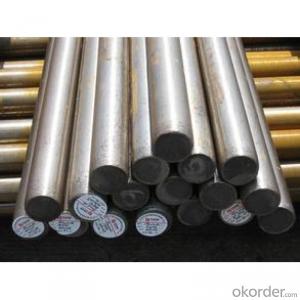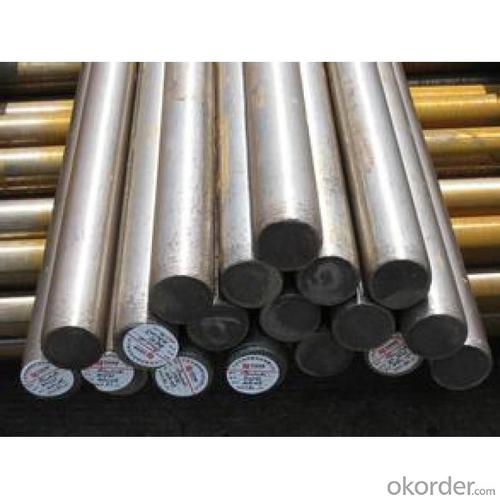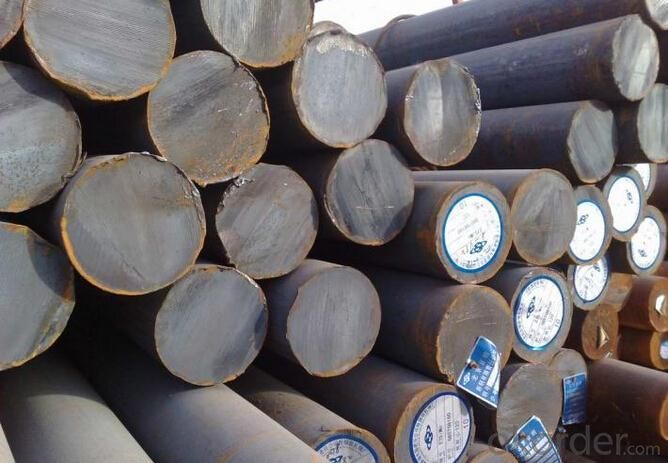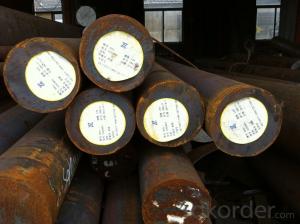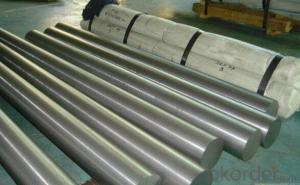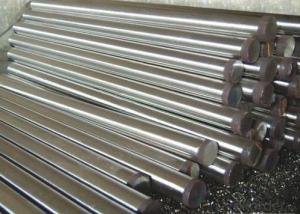Tool Steel Bar 40Cr Alloy Steel Round Bar
- Loading Port:
- China main port
- Payment Terms:
- TT OR LC
- Min Order Qty:
- 30 m.t.
- Supply Capability:
- 10000 m.t./month
OKorder Service Pledge
OKorder Financial Service
You Might Also Like
Specification
Tool Steel Bar 40Cr Alloy Steel Round Bar
Product information:
OD:10mm-1000mm
Length:As customer request
Grade:ASTM 1020/ ASTM 1035/ ASTM 1045/ ASTM 1050/ ASTM 1053/ ASTM 1566/ ASTM 5120/ ASTM 5140/ ASTM 4135/ ASTM 4142/ ASTM 1340/ ASTM 1541/ ASTM 1547/ ASTM 1022/ ASTM 1026/ ASTM 52100/ ASTM 4130 ……
DIN EN 1.0402/ DIN EN 1.0411/ DIN EN 1.0501/ DIN EN 1.0503/ DIN EN 1.0540/ DIN EN 1.7016/ DIN EN 1.7035/ DIN EN 1.7220/ DIN EN 1.7225/ DIN EN 1.5538/ DIN EN 1.0415/ DIN EN 1.7218/ DIN EN 100Cr6/ DIN EN 100CrMnSi6-4/ DIN EN 25CrMo4……And so on
Application:Applied to the equipment manufacturing industry, automobile, machinery industry and so on
Packaging:waterproof paper, steel strip packed. Or as customers requirement.
| Material: | 40Cr / 41Cr4 alloy steel specifications |
| Diameter: | 10mm-700mm |
| Length: | 3000mm-12000mm Straightness: 3mm/M max |
| Process: | EAF + LF + VD + Forged + Heat Treatment (optional) |
| Delivery condition: | Hot forged +Rough machined (black surface after Q/T)+ Turned (optional) |
| Delivery Time: | 30-45 days |
| MOQ: | 1 tons |
| Heat treatment: | Normalized / Annealed / Quenched / tempered |
| Technical Data: | According to the customer's requirement of Chemical Composition, Physical Properties and Mechanical Testing |
| Test: | Ultrasonic test according to SEP 1921-84 G3 C/c |
| Marking: | Grade, heat NO. length will be stamped one each bar with required color |
| Payment: | 30% advance by T\T, the balance against B/L |
| Application: | Statically and dynamically stressed components for vehicles, engines and machines. For parts of larger cross-sections, crankshafts, gears. |
Other product show:
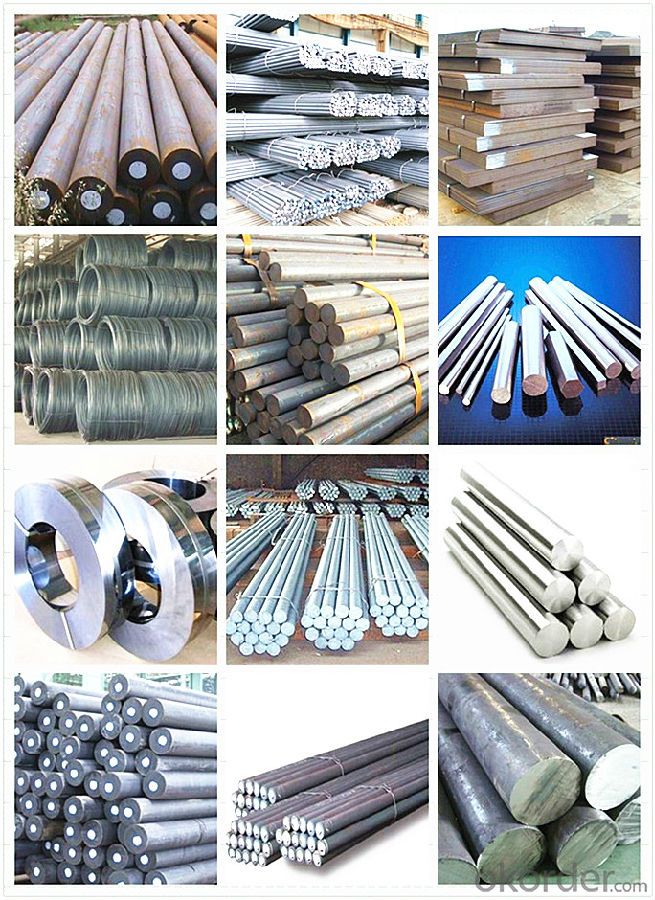
Our workshop show:
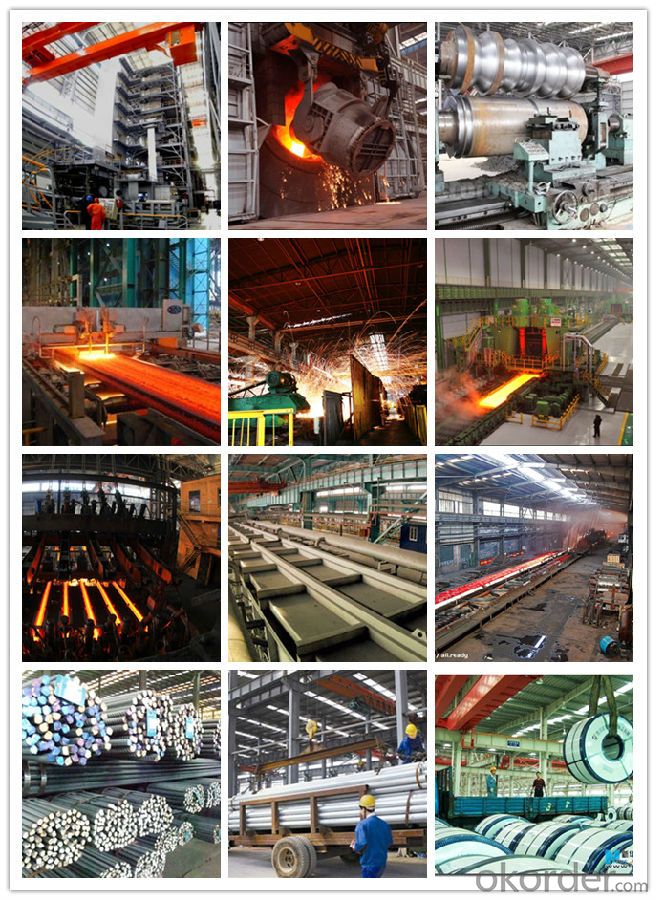
Our service:
-High manufacturing accuracy
-High strength
-Small inertia resistance
-Strong heat dissipation ability
-Good visual effect
-Reasonable price
Chose happens because of quality, then price, We can give you both.Additionally, we can also offer professional products inquiry, products knowledge train(for agents), smooth goods delivery, exellent customer solution proposals.Our service formula: good quality+good price+good service=customer's trust
SGS test is available, customer inspection before shipping is welcome, third party inspection is no problem.
If you need the sample, please feel free to let me know. Any question, we will contact you ASAP!
- Q: How does special steel perform in stamping applications?
- Special steel performs exceptionally well in stamping applications. It is specifically designed to withstand the intense pressure and forces involved in stamping processes. Its high strength and hardness properties enable it to maintain its shape and integrity during stamping, resulting in precise and accurate formed parts. Additionally, special steel's excellent wear resistance helps prolong tool life, reducing maintenance and replacement costs. Overall, special steel is a reliable and efficient material choice for stamping applications.
- Q: What are the different coating and plating options for special steel?
- There are various coating and plating options available for special steel, depending on the desired outcome and application. Some common options include electroplating with metals like nickel, zinc, or chrome for enhanced corrosion resistance, as well as hot-dip galvanizing to provide a thick layer of zinc coating. Other options include powder coating, which offers durability and a wide range of colors, and PVD (Physical Vapor Deposition) coating, which provides a thin, protective layer using vaporized materials like titanium or chromium. Additionally, specialized coatings like Teflon or ceramic coatings can be applied for increased non-stick properties or heat resistance. Ultimately, the choice of coating or plating depends on the specific requirements and performance expectations for the special steel.
- Q: How does special steel contribute to sustainable development?
- Special steel contributes to sustainable development in several ways. Firstly, it is highly durable and long-lasting, reducing the need for frequent replacements and the associated resource consumption and waste generation. Additionally, special steel is often used in energy-efficient applications, such as in the construction of wind turbines or energy-efficient vehicles, helping to reduce carbon emissions and combat climate change. Furthermore, special steel can be recycled and reused, minimizing the demand for virgin materials and reducing the environmental impact of the steel industry. Overall, the use of special steel promotes sustainable practices by extending product lifecycles, reducing energy consumption, and supporting a circular economy.
- Q: How does nitriding improve the wear resistance of special steel?
- Nitriding improves the wear resistance of special steel by introducing nitrogen into the surface of the material, forming a hard layer of iron nitrides. This hard layer increases the surface hardness and reduces the friction between the material and other surfaces, resulting in enhanced resistance to wear and improved performance in high-stress environments.
- Q: What are the specific requirements for special steel used in the railway sector?
- The specific requirements for special steel used in the railway sector are crucial for ensuring the safety, durability, and efficient operation of the railway infrastructure. Some of the key requirements include: 1. High strength: Special steel used in the railway sector must possess exceptional strength to withstand heavy loads, vibrations, and impacts. This is crucial for maintaining the structural integrity of tracks, bridges, and other components. 2. Wear resistance: Railway tracks and wheels experience significant wear due to continuous contact and friction. Special steel must have excellent wear resistance to minimize the need for frequent maintenance and replacement. 3. Fatigue resistance: The constant cyclic loading experienced by railway components demands high fatigue resistance in the steel. This allows them to withstand repetitive stress and prevents the occurrence of fatigue failures. 4. Corrosion resistance: Railway infrastructure is exposed to various environmental conditions, such as moisture, extreme temperatures, and chemicals. Special steel must possess good corrosion resistance to prevent rusting and degradation, ensuring a longer service life. 5. Heat resistance: In certain applications, such as rail joints and fasteners, special steel is subjected to high temperatures due to friction and stresses. The steel must have good heat resistance to maintain its mechanical properties under such conditions. 6. Weldability: Special steel used in the railway sector should have good weldability to enable efficient and reliable joining of components during manufacturing and maintenance processes. 7. Ductility and toughness: The steel must exhibit sufficient ductility and toughness to absorb energy and resist fracture in the event of a collision or impact, ensuring passenger safety. 8. Dimensional stability: Special steel used in the railway sector must maintain its dimensional stability under varying temperatures and loads to prevent deformation and ensure proper alignment of tracks and components. Meeting these specific requirements for special steel in the railway sector is essential for ensuring the safety, reliability, and longevity of railway infrastructure, contributing to the smooth operation of the entire transport network.
- Q: How does special steel contribute to the fatigue resistance of products?
- The exceptional fatigue resistance of products is attributed to the unique properties and manufacturing processes of special steel. Firstly, special steel is engineered and designed to possess enhanced strength and durability, resulting in high resistance against fatigue. This is achieved by incorporating alloying elements such as chromium, nickel, molybdenum, and vanadium, which enhance the material's ability to withstand cyclic loading and stress. Furthermore, rigorous heat treatment processes, including quenching and tempering, are employed to further improve the fatigue resistance of special steel. These processes refine the microstructure of the material, leading to a more uniform and fine-grained product. Consequently, the steel's ability to resist crack initiation and propagation, which are critical factors in fatigue failure, is significantly enhanced. Moreover, specialized surface treatments like shot peening or nitriding are often applied to special steel. These treatments introduce compressive residual stresses on the material's surface, acting as a barrier against crack formation and growth. This significantly boosts the fatigue resistance of the product. Additionally, special steel can be manufactured with specific grain orientations using directional solidification techniques. This allows for the alignment of grains along the primary loading direction, reducing the likelihood of crack initiation at grain boundaries and further improving the material's fatigue performance. In conclusion, the exceptional fatigue resistance of special steel is a result of its unique properties and manufacturing processes. The combination of enhanced strength, refined microstructure, specialized surface treatments, and tailored grain orientations make special steel the preferred choice in industries where fatigue failure is a concern. This ensures prolonged lifespan and reliability of products.
- Q: What are the requirements for special steel used in industrial equipment manufacturing?
- Special steel used in industrial equipment manufacturing typically has certain requirements to ensure its suitability for use in demanding applications. Some of the key requirements for special steel in this context include: 1. High strength: Industrial equipment often operates under heavy loads, so special steel must have excellent strength properties to withstand these forces. It should have a high yield strength, tensile strength, and hardness to prevent deformation or failure. 2. Corrosion resistance: Many industrial environments are prone to corrosion due to exposure to chemicals, moisture, or extreme temperature variations. Special steel used in such applications should have good corrosion resistance to prevent degradation and ensure long-term performance. 3. Wear resistance: Industrial equipment often experiences significant wear due to friction, abrasion, or impact. Therefore, special steel should have high wear resistance to maintain its integrity and prevent premature failure. 4. Toughness and impact resistance: Equipment used in industrial settings may face sudden shocks, impacts, or vibrations. Special steel should possess good toughness and impact resistance to absorb energy and resist fracture or cracking. 5. Heat resistance: In certain industrial processes, equipment may be exposed to high temperatures or rapid temperature changes. Special steel should have good heat resistance, with the ability to retain its strength, hardness, and other mechanical properties even at elevated temperatures. 6. Machinability: Special steel used in industrial equipment manufacturing should have good machinability to facilitate the fabrication process. It should allow for easy cutting, drilling, welding, and other machining operations without excessive tool wear or damage to the material. 7. Dimensional stability: Equipment components need to maintain their shape and dimensions under different operating conditions. Special steel should exhibit dimensional stability to prevent warping, distortion, or dimensional changes that could affect the performance or assembly of the equipment. Meeting these requirements ensures that special steel used in industrial equipment manufacturing can withstand the harsh conditions, provide reliable performance, and have a long service life, ultimately contributing to the overall efficiency and productivity of industrial processes.
- Q: How does special steel contribute to the manufacturing of cutting tools?
- Special steel plays a crucial role in the manufacturing of cutting tools due to its unique properties and characteristics. Firstly, special steel, also known as tool steel, exhibits high hardness, which allows it to withstand the tremendous forces and stress exerted during cutting operations. This hardness prevents the cutting tools from deforming or wearing out quickly, ensuring their longevity and efficiency. Additionally, special steel possesses excellent wear resistance. Cutting tools are subjected to constant friction and abrasion while in use, and the high wear resistance of special steel helps to minimize the wear and tear on the tools. This, in turn, leads to improved tool life, reducing the frequency of tool replacements and enhancing cost-effectiveness in the manufacturing process. Furthermore, special steel offers superior heat resistance. Cutting tools generate significant heat during machining operations, which can lead to thermal degradation and loss of hardness in conventional steels. However, special steel can withstand high temperatures without compromising its hardness and integrity. This heat resistance allows cutting tools to maintain their performance even under extreme heat conditions, ensuring consistent and precise cutting results. Moreover, the special steel used in cutting tool manufacturing often exhibits excellent toughness and strength. This enables the tools to endure heavy loads and impacts without fracturing or chipping. The combination of hardness, wear resistance, heat resistance, toughness, and strength provided by special steel ensures the durability and reliability of cutting tools, allowing them to perform efficiently and accurately. Overall, special steel significantly contributes to the manufacturing of cutting tools by providing the necessary properties to withstand the demanding conditions encountered during cutting operations. Its high hardness, wear resistance, heat resistance, toughness, and strength ensure that cutting tools remain sharp, durable, and efficient, thereby enhancing productivity and precision in various industries, such as automotive, aerospace, and manufacturing.
- Q: How does special steel contribute to reducing product defects during manufacturing?
- Special steel contributes to reducing product defects during manufacturing by offering enhanced mechanical properties and superior strength. This type of steel is specifically designed to meet the requirements of demanding applications, making it less prone to deformation, wear, or failure. Its exceptional hardness and toughness properties enable manufacturers to produce components with precise dimensions and high accuracy, resulting in reduced defects. Additionally, special steel's excellent corrosion resistance prevents rusting and deterioration, ensuring the longevity and reliability of the manufactured products.
- Q: How does special steel perform in nuclear applications?
- Special steel performs exceptionally well in nuclear applications due to its unique properties. It has high strength, excellent corrosion resistance, and exceptional temperature resistance, making it ideal for containing and transporting radioactive materials. Special steel also maintains its structural integrity even under extreme conditions, such as high radiation levels and elevated temperatures, thus ensuring the safety and reliability of nuclear facilities. Additionally, its excellent weldability and formability allow for precise fabrication, enabling the construction of complex nuclear components. Overall, special steel plays a crucial role in enhancing the efficiency, durability, and safety of nuclear applications.
Send your message to us
Tool Steel Bar 40Cr Alloy Steel Round Bar
- Loading Port:
- China main port
- Payment Terms:
- TT OR LC
- Min Order Qty:
- 30 m.t.
- Supply Capability:
- 10000 m.t./month
OKorder Service Pledge
OKorder Financial Service
Similar products
Hot products
Hot Searches
Related keywords
